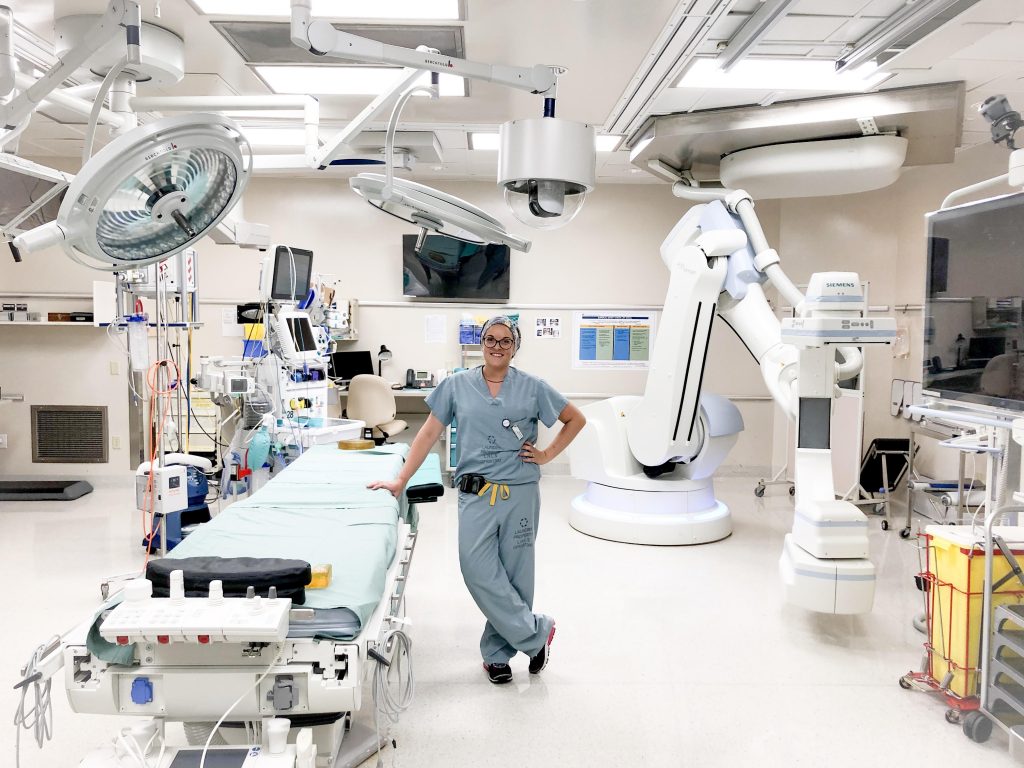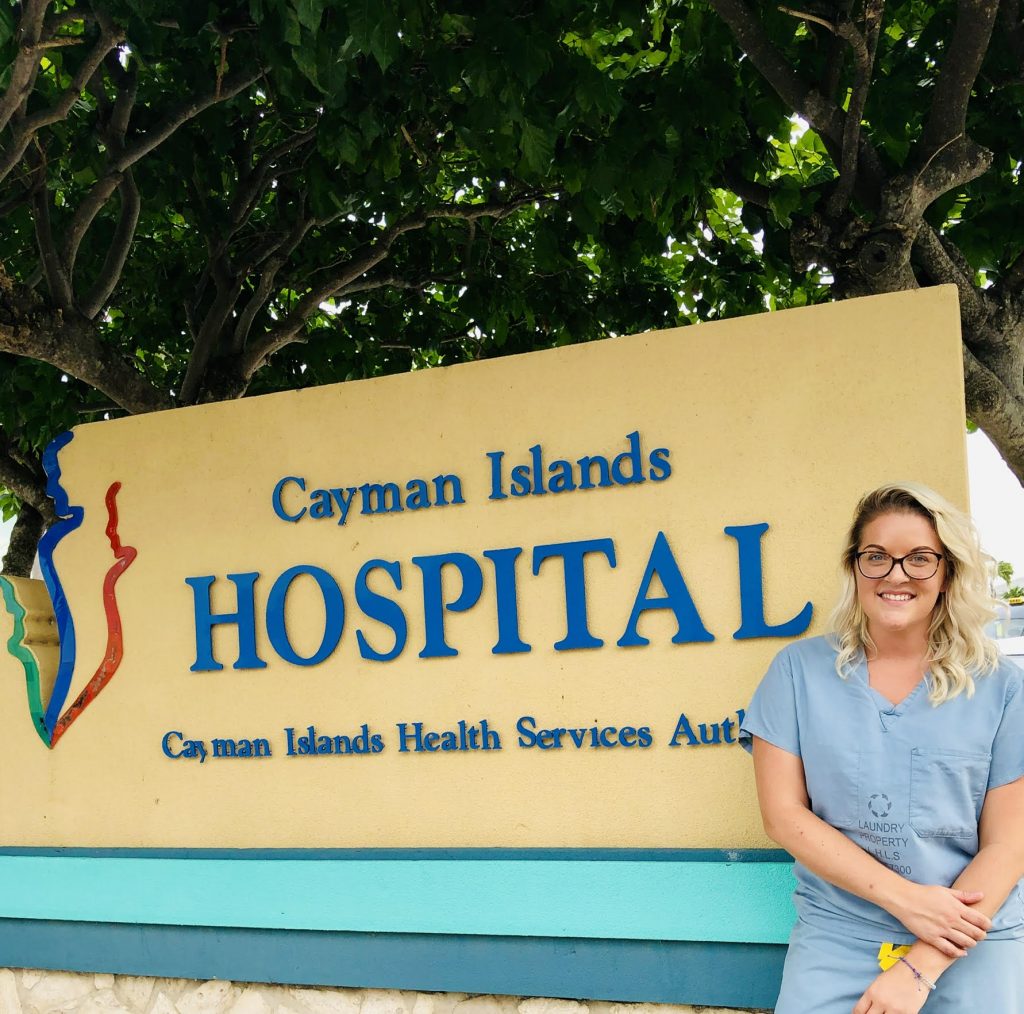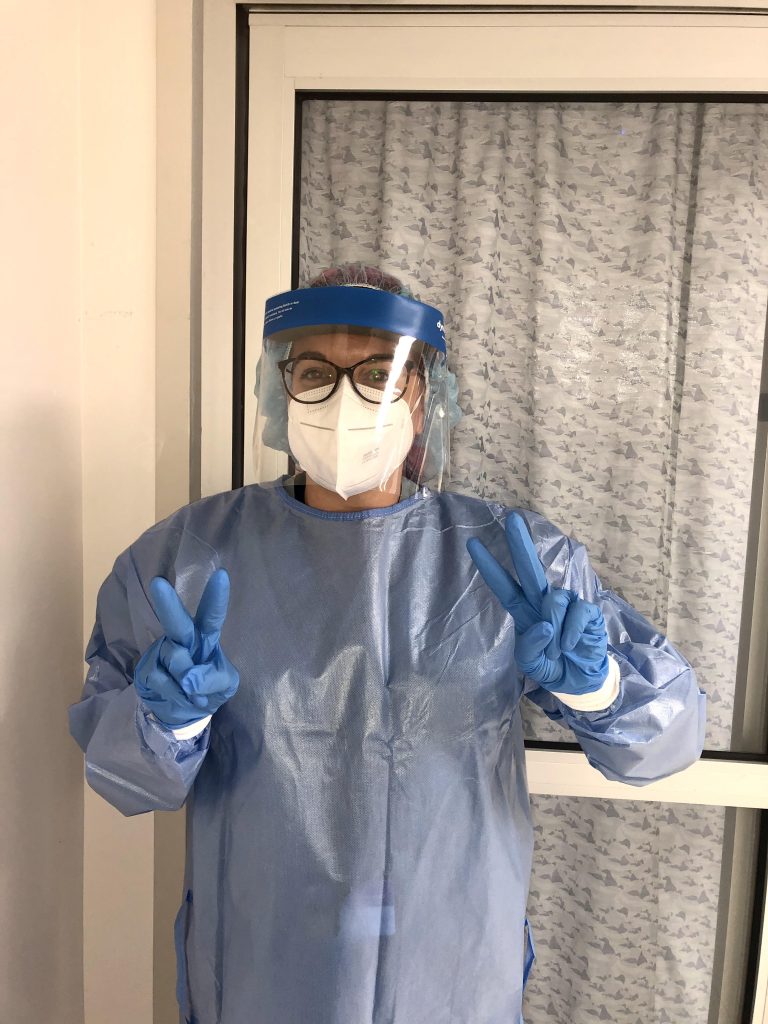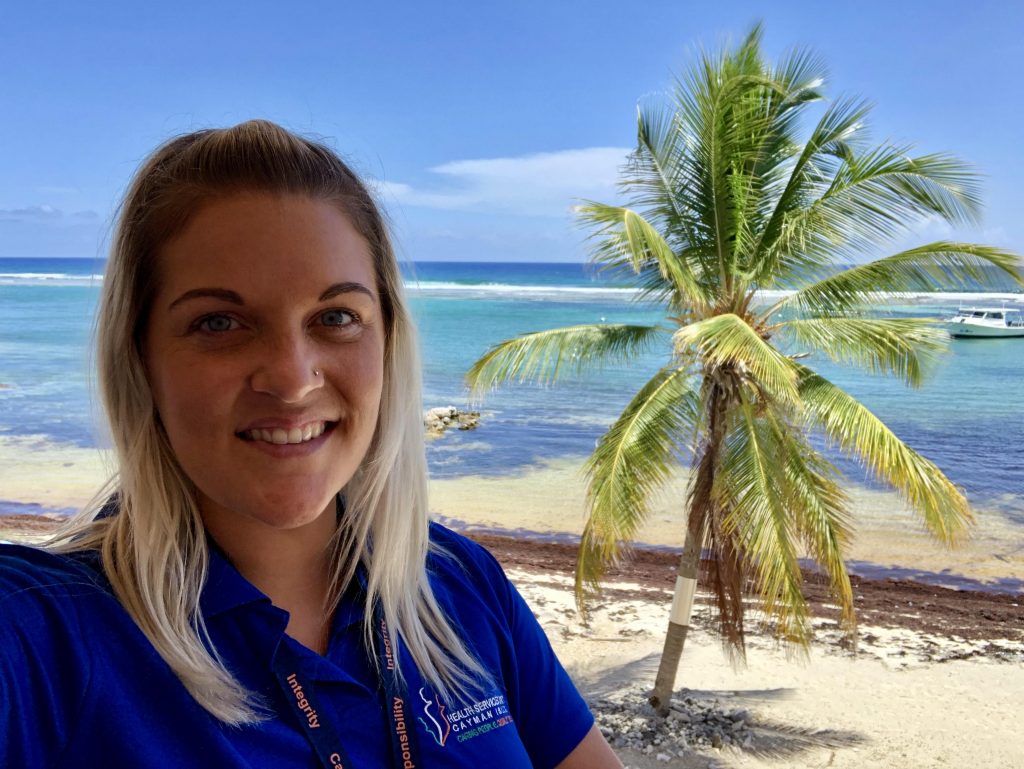I have the pleasure of sharing my interview with Rachel Nesbitt with you. Over the past few years, I have had the chance to know more about her and feels like she has taken on a different adventure each year: working in Canada, abroad, in medical sales or everything required in a hospital and much more. Rachel also tells us about her medical missions toward the end of the interview along with some great photos. Without further ado… meet Rachel!

How did you find out about the field of respiratory therapy?
I went into Respiratory right from high school. I really had no idea what I was getting into. I just knew I wanted something in health care but not to be in post-secondary for the next 15 years of my life. Just like most of the general public, I thought the only ones who worked at the hospital were nurses or Doctors. After learning what an RT really is, you start to realize you really DO know lots of people in the field, I just thought they were nurses growing up.
Why did you choose to become an RT?
“I didn’t choose the RT life, the RT life chose me.”
The RT’s I went to school with (shout out to Fanshawe Class of ‘06), the RT’s I’ve worked with over the years, and every CSRT conference I’ve ever been to, really make me believe that we are on a special level together and fit like a puzzle. Like each one of us found our calling no matter what brought us into the RT world. This is exactly what I’m supposed to be doing and can’t imagine what my life would have been like without the world of Respiratory.
What are some of your memorable moments working as an RT so far?
I started off my RT career with a bang! In my 3rd year clinical, I was very pregnant with my now 14-year-old daughter Jacey. There were 2 weeks at the end of the year where you went back to Fanshawe to take your ACLS and write exams. I wasn’t due for another 6 weeks so thought I had plenty of time. On the first day of ACLS I started having severe back pain. It wasn’t labour it was a kidney stone! So I was admitted to the hospital. I received a phone call from the school saying unfortunately if I didn’t write this series of exams I couldn’t graduate with my class. So the next day I signed myself out AMA and met Mrs. Annett at the school and wrote all the exams. Turns out if you don’t overthink those exams, you ace them! While the rest of our class was enjoying their 3rd-year farewell party I was busy having a baby! My class, my preceptors in clinic and Mrs Annett were so supportive, it’s one of my favourite memories. 2 weeks after delivery I started my orientation at LHSC- Victoria hospital.
I worked at LHSC for 10 years. There I was trained in adult ICU/wards and ER. After 2 years, I trained in Pediatrics IUC and worked for year. Peds wasn’t my flavour so moved to the Operating room where I felt so at home! I loved assisting anesthesia and everything about the OR. I always thought I would I would work at Vic until I retired. The RT’s there were my best friends and like family to me.
In 2016 my husband was offered a job that made me rethink my path. I had to quit my position at LHSC and moved across the ocean to Grand Cayman. Initially, there were no jobs for an RT so I went back to school to take a course for medical injectables. I got a job at a cosmetic clinic working with a dermatologist to do Botox and fillers. Well the RT life knew I belonged in that world so not even 2 weeks after I was in Cayman I was contacted by the government hospital and offered a job. I was thrilled to be back in the hospital doing what I loved but this was a very different role than the OR. At Health Service Authority in Grand Cayman there had been 1 RT for many years but they were expanding so I made a department of 2. We are “Jack of all trades” much like many rural hospitals at home. It was a lot of firsts for me. I was now doing chest physio, sleep studies (Doing and scoring both level 1 and 3), PAP therapy, PFT, home oxygen and NICU. I spent a lot of time self-learning and taking any courses I could find online. And if I was ever stuck, I had my amazing friends at LHSC for an “overseas consult”. I never realized how many avenues there were in Respiratory. After a year in paradise, we moved back home to London where I figured I’d try another new RT path. SALES. I was so nervous to make the jump. I wasn’t sure I could do it. It was so out of my comfort zone. I took a territory sales rep job at VitalAire. The first 6 months were really difficult trying to navigate through but then it just seemed to click. I got the hang of it and to my surprise did really well! I spent the next 2 years in sales there but then was offered a position as manager for southwestern Ontario. I managed 4 branches and 30 staff for just over a year. I can’t begin to explain how much I learned and grew in that 4 years of my career. I am still so amazed at how far our profession has come. RT’s are not one-trick ponies! There are so many opportunities in our field and I feel like I want to experience them all!
What can you tell us about the medical sales role? What’s a typical day in this role?
Starting in sales was very intimidating. When I started, I felt so out of place like everyone else on the sales team knew so much more than I did since I was “just an RT” and not a salesperson. Then I realized I was the only one putting myself in that box. Sales were all about making relationships and earning trust from clients. And when you work in sales of respiratory equipment or services, who better to make those relationships with RT’s than another RT!!?!
I was most comfortable on days I went to visit RT departments…felt natural to carry a conversation with them. It’s always nerve-wracking when you have to go into a new doctor you’ve never met. It’s hard enough to get a moment of their time so you don’t want to blow it. But after a while I realized, I’m an RT! I know all things respiratory. I am the expert in my field and I have knowledge to share with these physicians. Once I learned that I gained confidence and those appointments became easy too.
I covered Southwestern Ontario so each week I would plan my visits to different doctors offices, Hospitals and sleep labs. Some days were fun and easy, like a visit to an RT department to say Hi and show presence. Some days are more difficult when you have to put out fires if things didn’t go as planned and you have to do damage control. Some days were cold calls with no appointments and just spreading the word of your company and services. I love to talk and to teach so my favourite days were when I got to do lunch and learns.
Your current role involves various responsibilities. What’s a typical day for you?
Currently, I have a cushy Monday to Friday 7-3 gig with an every other Friday night shift thrown in. From 7-9 I start in the ICU for rounds and vent adjustments and weaning. Then outpatient appointments start at 9am, so could be a CPAP start, PFT or level 3 sleep study. At 11am the other therapist comes in and she takes over the rest of the outpatient appointments. I go back into the ICU or med/surg ward to start the chest physio patients. On Tuesdays and Thursdays, we have a half-day pulmonology clinic which means back to back spirometry for 3 hours. Throw a NICU vent in here and the whole day is a write-off! Usually, our prem babies would be transferred overseas to Miami Children’s, however, with COVID we’ve been holding on to a lot more of our wee ones. On Friday nights we do our level 1 in house sleep studies. Since there are 2 of us, we alternate every other one. We are not a 24-hour service. Anesthesia is on call for overnight vent issues. There is plenty to keep us busy on this little Island!
How did you decide to work in Cayman Islands? What can you tell me about the experience?
Living and working on a small island has its ups and downs. In a dept of 2, you really don’t have the same opportunities to bounce ideas off coworkers. I really depend on our nursing staff and physicians here. And in turn they really respect the role and are always looking for input which feels nice to be appreciated.
Between teaching breathing exercises to a post-op patient, or education on a new PAP therapy machine, or showing a family member how to work the oxygen concentrator, I feel patient education takes up a large portion of our day.
We fall under the nursing manager of Critical care who is really amazing and easy to talk to and trusts our judgment. We currently are working on the Methacholine protocol so we can start that next month which we pulled from the AARC guidelines. Many of our others like home oxygen qualifications, we use Ontario guidelines.
There is a regulatory body here which is called the Council Professions Allied with Medicine (CPAM). We need to renew our license every 2 years.
The biggest challenge for me was adapting to insurance-based medicine. Having to ask for funds or insurance cards before every appointment or thinking twice before you use a supply knowing the patient may have to pay out of pocket for it.
International moves and immigrating are not easy! You live year to year hoping your next work permit will be approved so you can stay. Work permit holders children have to attend private school which is expensive but this is a tax-free island so it washes out. It’s strange to just walk out with your salary every month tax free!
I’ll put my plug in here… We are currently hiring 1 RT to join me here in Cayman! If you’re a jack of all trades or at least willing to learn, send me a message!

Can you give an example of working in the insurance-based medicine? How would you a clinician approach this? What are the ways clinicians provide patient care when additional testing is not an option?
When a hospital relies on insurance coverage to get paid, almost everything needs to be pre-approved especially in an outpatient setting. When we get a referral from a physician for a sleep study or PFT, we send that to a preapproval team who contacts the insurance company. The insurance either gives the go ahead or patient to pay out of pocket. When an in- patient has insurance, it is very rare that things wouldn’t be funded and things are less stressful. When a patient has no coverage at all, it is very hard to see. For example, pre-COVID, many cruise shippers come to port here, fall ill and need ICU care and medivac back home. Most don’t realize that OHIP or Medicare don’t cover your medical out of province or country and the family is stuck with having to pay for bills of up to 50K. Please, please, please always get travel insurance my friends!
How was/is your experience with COVID?
Wow COVID. The word makes me shiver. I think about the countless hours I spent working with management in preparation for what could devastate a little island like ours. We have an 8 bed ICU. Which means maybe 15 vents if I use our home vents, ER vents and transport vent. There is a private hospital on the other side of the island which has about another dozen vents. We are lucky that this is not a third world country and our government was able to procure extra vents just incase. They even opened an emergency field hospital in anticipation of COVID overload. Cayman was well prepared and quick to act shutting boarders down early which allowed for the virus to be very well controlled here. To date, we’ve had 201 confirmed cases in a population of 65000. 1 death and 194 fully recovered. We did not see the critically ill that the rest of the world saw. We had plenty of practice with every vent that came into ICU treating as suspected with full PPE until swab came back negative, but we only saw 1 true COVID vent!!! And I was able to extubate him in about 5 days on being on vent. We had a separate unit called Respiratory Care Unit which housed all our confirmed COVID patients that required hospitalization. The open style ward was able to hold 8 at a time which was all we luckily needed and the field hospital was not used. Those with oxygenation issues we maintained on high flow nasal cannula with Airvo or Maxventuri units. The staff were always in Full PPE and only confirmed COVID patients in the unit. With only 6 active cases currently and zero in hospital we are very happy to say the restrictions have eased. We had weeks of mandatory isolation, only essential staff allowed out of your house to go to work. And essential here was legit essential. Hospital workers, grocery store staff and police. You were only allowed to grocery shop on your name day. Last name A-L Monday, Wednesday and Friday. M-Z Tuesday, Thursday and Saturday with a hard lockdown on Sunday no one allowed out. Police had roadblocks and checked licenses everywhere you went. This was the first time I really regretted keeping my Maiden name as I couldn’t go anywhere with my family lol. Our boarders remain closed and masks are law anywhere in public space. I will be forever thankful when I never have to hear the word COVID again!

How do you see our field change over the next 10 years?
I think the RT world already has so much to offer its just what opportunities will you cease?! We’ve got RTs in clinical, management, research, sales, marketing, and education. Don’t be afraid to branch out and try something new. I’ve discovered that door opens 10 more.
What advice do you have for those who are thinking about working in another respiratory care setting but are unsure?
When I went to work in Sales/management I kept my job Casually at Vic. That allowed me to work weekends and keep up my clinical skills (plus socialize with my peeps!)
Putting work aside for a moment, how do you enjoy your time over there?
Beach, Brunch and repeat!
Also any chance I get, even though its work-related, I LOVE medical missions. It gives you the opportunity to travel and see the world while also seeing how medicine works in other countries. You come back feeling appreciative of what we have and the luxuries our hospitals have. PLEASE PLEASE PLEASE if you ever get the chance, GO! You will never regret it. It will be the most humbling experience of your career I assure you.

Any recent medical missions that you can tell us about?
I’ve been to China twice and Peru twice for medical missions. My most recent mission was Peru in 2018. This is a team put together by the fearless leader Peter Allen, a perfusionist at University hospital in London. These are cardiac missions where a full surgical and post-op team travels to perform and teach cardiac procedures. It’s a multidisciplinary team of perfusionists, ICU nurses, Surgeons, anesthesia, scrub nurses, RTs, and physio from around Ontario. We are always welcomed with open arms. We spend 1 full week performing surgeries which usually fits in 6-8 procedures depending on the difficulty. There is usually 3-4 RTs on the team and we split the shifts day/evening. 1-2 in the OR in the morning setting up for the case and assisting with induction. And the afternoon crew worked in ICU to receive and wean the post-op patient.
The first time I traveled to Peru there was a young woman who was a teacher. She had cardiac complications from pregnancy and they were unable to get her off the vent. While we waited for our post op patients, we spent time in the other ICU sharing our weaning protocols. Every day we worked with her and by the end of the week, she was more off the vent than on. I’ll never forgot how happy my heart was when I received an email from her that she was home, fully recovered and decannulated! When I returned in 2018, she came to the hospital to see me and I was so happy to see her. I still stay in touch with her to this day. Missions are where you really feel like you make a difference.
The local teams always work hand in hand with us. We teach them the tricks we know and I can say I’ve learned some pretty amazing things from them too. I’ve made some wonderful friendships on these journeys and am still in contact with a lot of them.
And my favourite part is the time spent outside of the hospital at the local orphanage in Peru. We take turns going each day to help sand, paint, sew curtains or help in any way we can. After the kids get home from school, we help them with homework and play. Seeing those smiles and personalities is priceless. I’ve always fundraised before I go to make sure we can leave behind some money to help with expenses. Jose and Gloria who run the orphanage are always sending updates. They are truly heroes in my eyes.
I would like to thank Rachel, RNesbittphotography@gmail.com, for telling us about her journey! Did you enjoy this interview? Make sure you like and share this post with others!
Farzad Refahi
July 19, 2020
https://www.Respiratory.Blog/Rachel/




